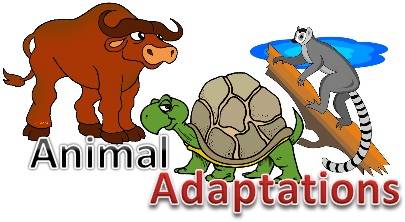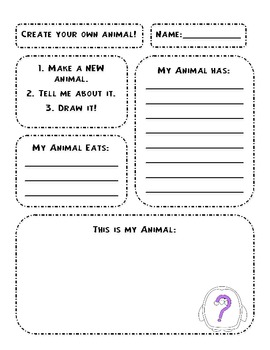My name is Jahilah Brooks. I am a junior attending the University of the Virgin Islands. My major is Elementary Education. I develop this Webquest in the hope to develop students thinking skills. I hope my Webquest allows students to use their imagination and problem-solving skills. I would incorporate my Webquest into my classroom as a classroom manager. Since the pandemic, it would be easier to update the classroom agenda, homework assignments, and notes to my student's parents.
Introduction

Hello Scholar Scientists! Plants and animals are adapted to their environments so they can survive their conditions. Physical adaptations help animals survive in their environment, while behavioral adaptations allow animals to respond to life needs. By studying various ecosystems in the world around us, you see that in order to survive, animals act in different ways to gather and store food, find shelter, defend themselves, and raise their young.
Task
“Create-an- Animal"
Today, you are a zoologist, who has just discovered a new animal. You will be creating an imaginary animal with the behavioral and physical adaptations of your choice. You will design the animal, draw a picture of it, and then write a short biography that describes the animal's adaptations. In your biography, you must name your animal (and explain why you chose that name), describe what it looks like, where it lives, what it eats, how it moves, how it raises its young, and it is two physical and behavioral adaptations.

Process
Step 1:
Start with the link below:
1. Based on the video what is adaptation? Please define this in your own words.
2. Give two examples of adaptations you view in the link above.
NEXT
https://www.nationalgeographic.org/encyclopedia/adaptation/
1. Read through the information.
2. Pick three unfamiliar words.
3. Use clues around the world to give your idea of the definition.
4. Then check the definition of the word
ART TIME!
1. Design your own imaginary animal. Draw what your animal looks like and draw its habitat in the background.
2. Write a biography of your animal. Be sure to name your animal, describe where it lives, what it looks like, what it likes to eat, how it raises its young, and its moves. Include at least two structural/physical adaptations and two behavioral adaptations. Describe the animal's adaptation and how that adaptation helps the animal survive.
FINAL (This information should be attached to the animal you created).
Answer the following questions:
1. Have you ever adapted to something. Explain. Give examples.
2. What surprised you?
3. What did you already know about adaptation?
Evaluation
|
|
10-50 |
51-60 |
61-89 |
90-99 |
Score |
|
Idea |
Unfocused, completely out of ideas, things that are not identified, the long and not sufficiently developed. |
Many are repeat text and as a collection of ideas that are not related Less specific details and more common |
In general, on-topic and develop a theme or message clear Some concrete and detail, and be some still common |
One idea is clear, focused, and on-topic Their concrete details and specific Interesting detail to support the idea All parts of an integrated and conform |
30 |
|
Vocabulary |
translating and word choice and usage inadequate |
Often times there are errors form of words/phrases/idioms and word choice and usage |
Once in a while there are errors form of words/phrases/idioms, the choice of words and their use but does not affect the meaning essentially |
Use and choice of the word/idiom / phrase proper, appropriate and effective |
20 |
|
Organize |
The idea is not communicating and meaningless- and disorganized |
sometimes ideas tend to be confusing and incoherent |
less organized but the main idea remains the focus |
Disclosure ideas clearly and fluently written |
30 |
|
Mechanics |
No mastery of writing conventions, and many errors in spelling and punctuation, and capitalization |
Frequent errors in the use of writing conventions, spelling and punctuation, and capitalization |
Sometimes errors are made in the use of writing conventions, spelling and punctuation, and capitalization |
Master writing conventions, spelling and punctuation, and capitalization with excellent |
20 |
Conclusion
Congratulations Scholar Scientists! You have done a fanciful job researching animal adaptations and inventing your own new animals that can adapt to the world around us. You have done a great job using your investigating skills to explore how animals use migration, camouflage, mimicry, and learned behaviors to respond to their environment. This will be a great idea to keep in mind when we study ecosystems!